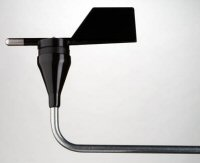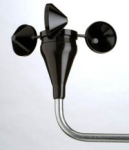RETIRED ›
This product is not available for new orders.
This product is not available for new orders.

| Services Available |
|---|
Overview
NRG's 200P wind direction vane is commonly used in wind prospecting applications. The thermoplastic and stainless steel components resist corrosion and contribute to a high strength-to-weight ratio. The vane is connected to a precision conductive plastic potentiometer located in the main body. An analog voltage output directly proportional to the wind direction is produced when a constant DC excitation voltage is applied to the potentiometer. A rubber terminal boot is included.Images

Similar Products
Compatibility
Note: The following shows notable compatibility information. It is not a comprehensive list of all compatible or incompatible products.
Data Loggers
| Product | Compatible | Note |
|---|---|---|
| 21X (retired) | ||
| CR10 (retired) | ||
| CR1000 (retired) | ||
| CR10X (retired) | ||
| CR200X (retired) | ||
| CR206X (retired) | ||
| CR211X (retired) | ||
| CR216X (retired) | ||
| CR23X (retired) | ||
| CR295X (retired) | ||
| CR3000 (retired) | ||
| CR500 (retired) | ||
| CR5000 (retired) | ||
| CR510 (retired) | ||
| CR800 (retired) | ||
| CR850 (retired) | ||
| CR9000 (retired) | ||
| CR9000X (retired) |
Additional Compatibility Information
Data Logger Considerations
The Wind Vane requires one single-ended channel and access to an excitation channel (the excitation channel can be shared with other high impedance sensors).
Programming
The wind vane is measured by the BrHalf Instruction in CRBasic and by Instruction 4 (Excite-Delay-SE) in Edlog. The measurements are typically processed for output with the Wind Vector Instruction (not present in the CR500 or CR9000).
Specifications
| Sensor | Vane |
| Measurement Description | Wind direction |
| Measurement | Analog potentiometer (half bridge) |
| Range | 0° to 360° |
| Operating Temperature Range | -55° to +60°C |
| Starting Threshold | 1.0 m/s (2.2 mph) |
| Swept Diameter | 27 cm (10.5 in.) |
| Length | 21 cm (8.3 in.) |
| Height | 12 cm (4.3 in.) |
| Weight | 0.14 kg (0.3 lb) |
Frequently Asked Questions
Number of FAQs related to 200P: 1
-
- Using Short Cut, click the applicable wind direction sensor in the Selected Sensors list of the Outputs screen.
- The two output options enabled are Sample and WindVector. Select WindVector.
- The WindVector instruction has output options. Select an option with mean wind direction in it.
Privacy Policy Update
We've updated our privacy policy. Learn More
Cookie Consent
Update your cookie preferences. Update Cookie Preferences
